
1. Hue Historic Citadel
Visiting the Historic Citadel of Hue is a history lover's paradise. This majestic UNESCO World Heritage Site was the epicenter of imperial power during the Nguyen Dynasty. Marvel at the architecture and soak up the history as you stroll through the gardens. Don't forget to attend the traditional performances at the Royal Theater, which are a real insider's tip. Be mesmerized by the minimalist but profound Thien Mu Pagoda near the Citadel as you gaze out over the Perfume River.
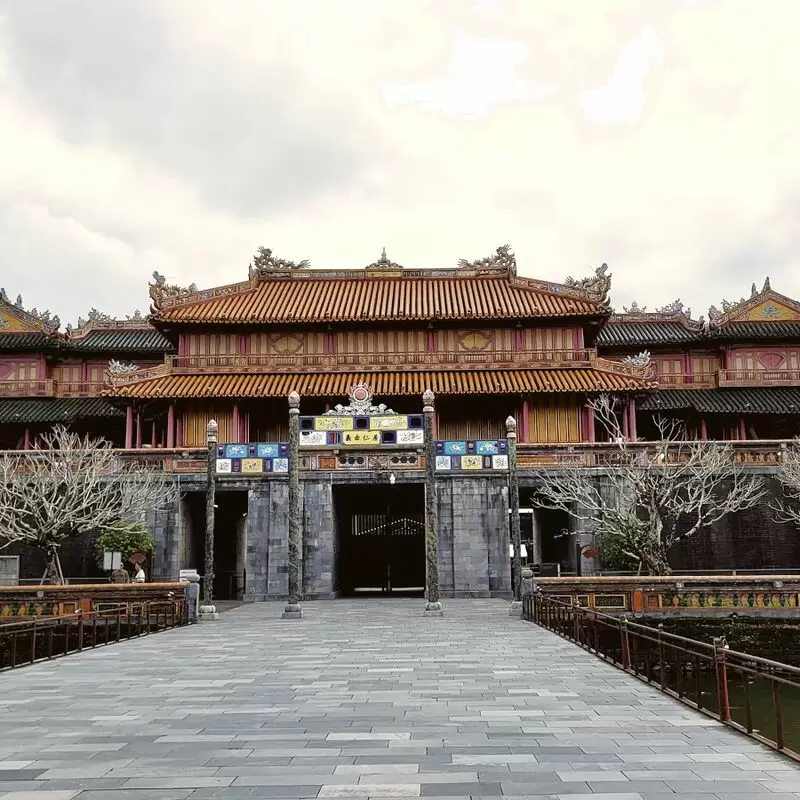 Hue Historic Citadel
Hue Historic Citadel
Thua Thien Hue
Monday - Sunday: 7:30 AM – 5:00 PM

Thua Thien Hue
2. Mausoleum of Emperor Khai Dinh
Immerse yourself in Vietnam's rich history at the Mausoleum of Emperor Khai Dinh, an architectural masterpiece that combines Eastern and Western elements. Marvel at the ornate glass and porcelain decorations of the exquisite Thien Dinh Palace. Enjoy the tranquility and seclusion from the hustle and bustle of the city during a visit to the burial site, located on a quiet hillside. Afterwards, take a detour to the nearby An Dinh Palace, which once served as the residence of the Nguyen Dynasty and houses well-preserved artwork and interior decorations. Don't leave town without trying the local street food around the corner!
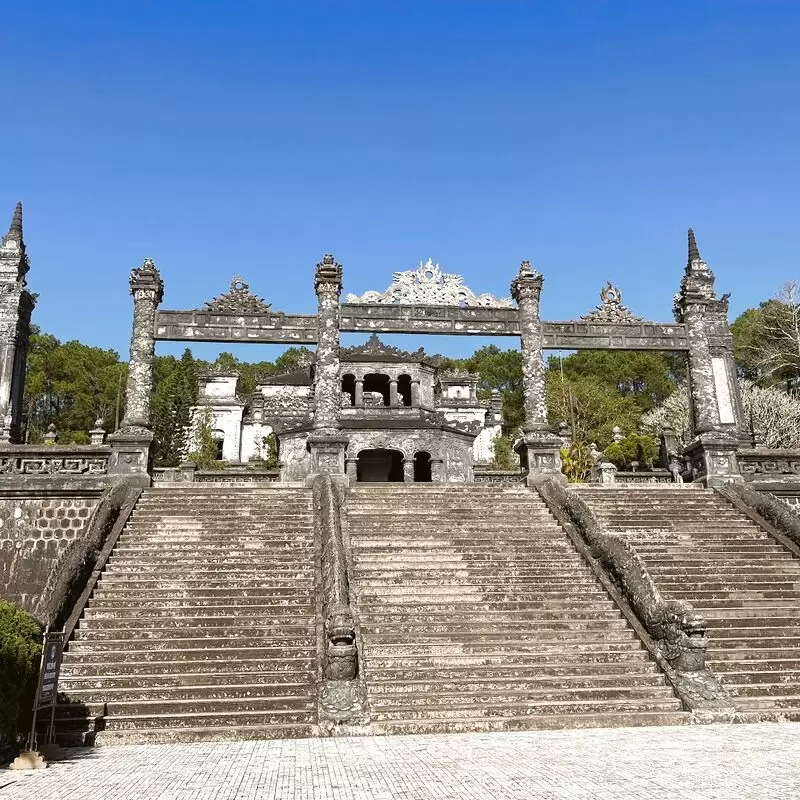 Mausoleum of Emperor Khai Dinh
Mausoleum of Emperor Khai Dinh
xã Thủy Bằng huyện Hương Thuỷ, Thủy Bằng, Thua Thien Hue
Monday - Sunday: 7:00 AM – 5:30 PM

xã Thủy Bằng huyện Hương Thuỷ, Thủy Bằng, Thua Thien Hue
3. Thien Mu Pagoda
Immerse yourself in the history and spirituality of Thien Mu Pagoda, perhaps the most famous sight in Hue. Admire the beauty of the 7-story Phuoc Duyen Tower rising against the backdrop of the tranquil Perfume River, on which monks silently shuttle back and forth. Let the gentle scent of incense take you back to centuries of Buddhist wisdom. Nearby, the dreamy Hon Chen Temple, hidden in the forest, offers a different, quieter charm. Don't miss the picturesque view of the sunset on the riverbank.
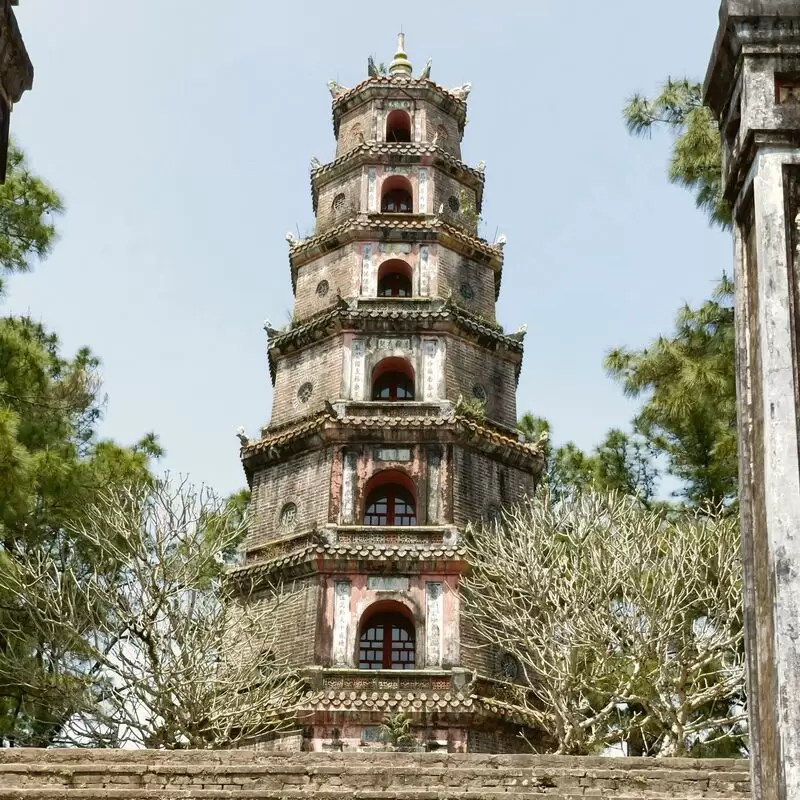 Thien Mu Pagoda
Thien Mu Pagoda
Huế, Hương Hòa, Thua Thien Hue
Monday - Sunday: 8:00 AM – 6:00 PM

Huế, Hương Hòa, Thua Thien Hue
4. Mausoleum of Emperor Tu Duc
Embark on a journey through time at the Mausoleum of Emperor Tu Duc. Here, the opulence of the Nguyen Dynasty unfolds amid tranquil gardens, shimmering lotus ponds, and intricate architecture. Tu Duc, who was known as the Poet King, created this tranquil paradise as a retreat from the intrigues of the palace. As dusk colors the sky, breathe in the evocative scent of incense heavy in the air. Near the mausoleum, experience the ancient Zen ambience of Thien Mu Pagoda, an inspiring seven-story monument overlooking the Perfume River.
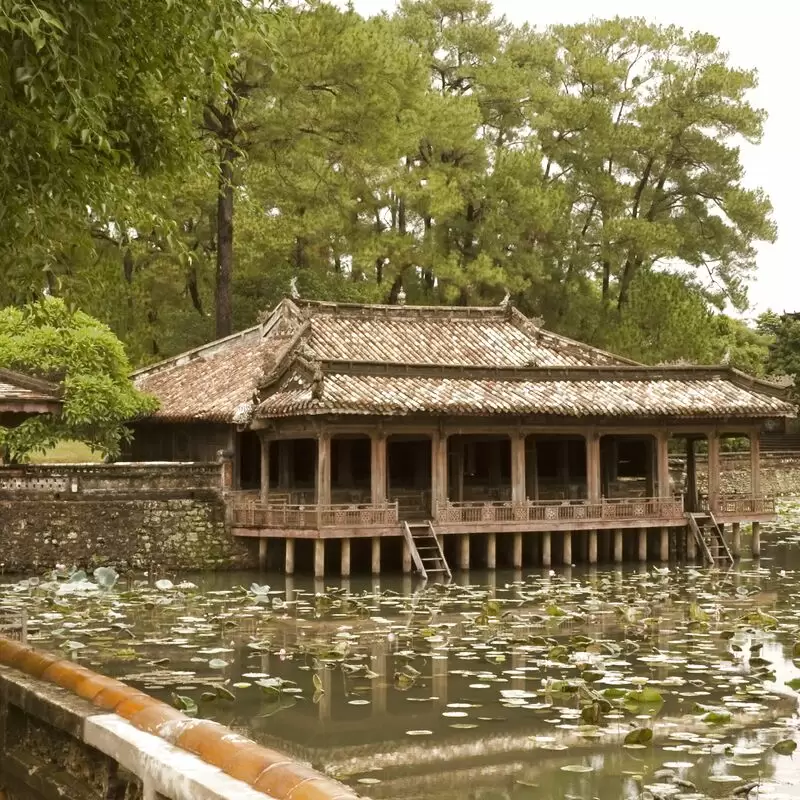 Mausoleum of Emperor Tu Duc
Mausoleum of Emperor Tu Duc
Cầu Đông Ba, thôn Thượng, Thua Thien Hue
Monday - Sunday: 7:00 AM – 5:30 PM

Cầu Đông Ba, thôn Thượng, Thua Thien Hue
5. Mausoleum of Emperor Minh Mang
Immerse yourself in Vietnamese history by visiting the Mausoleum of Emperor Minh Mang, a testimony of the past in harmonious architectural composition with nature. Its aesthetics are captivating and reflected in the lake shaded by lush forests. Insider tip: Come early to enjoy the tranquil atmosphere. Nearby is the Imperial City, another testament to imperial majesty that will bring you closer to Vietnam's royal past.
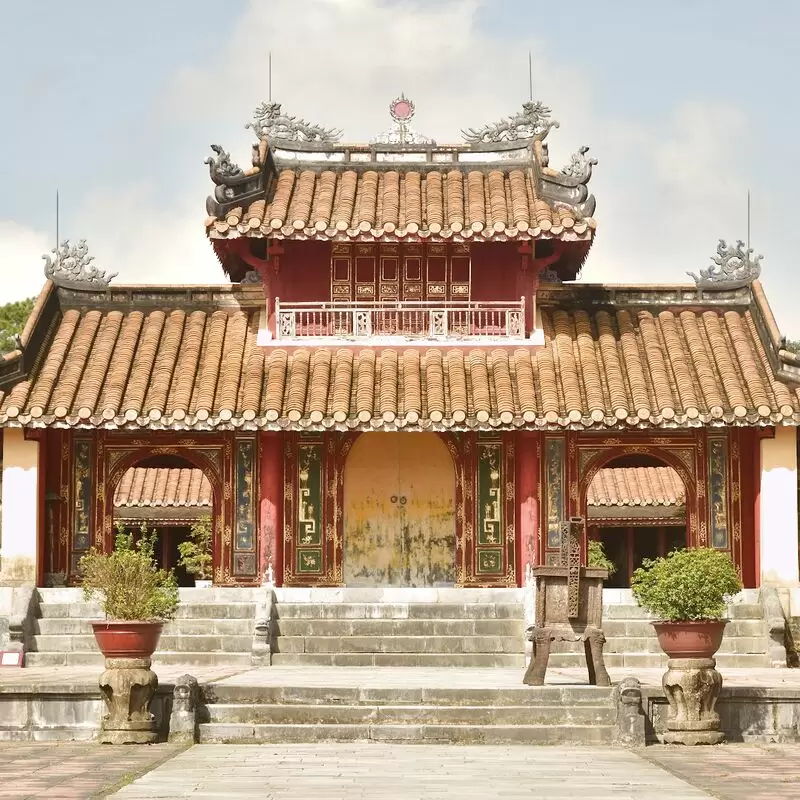 Mausoleum of Emperor Minh Mang
Mausoleum of Emperor Minh Mang
Unnamed Road, 9HQC+CW2, Hương Thọ, Thua Thien Hue
Monday - Sunday: 7:30 AM – 5:00 PM

Unnamed Road, 9HQC+CW2, Hương Thọ, Thua Thien Hue
6. Vong Canh Hill
A hidden gem in Hue, Vong Canh Hill offers stunning panoramic views of the Perfume River and the Royal Tombs. Surrounded by green orchards and tranquil pine forests, it is the perfect place for a quiet retreat. At dawn and dusk, the changing hues of the sky provide a magnificent spectacle. Don't miss the nearby tea gardens where you can sample local specialties. Just a stone's throw away is the ancient Minh Mang Tomb, another place steeped in history that is a must-visit.
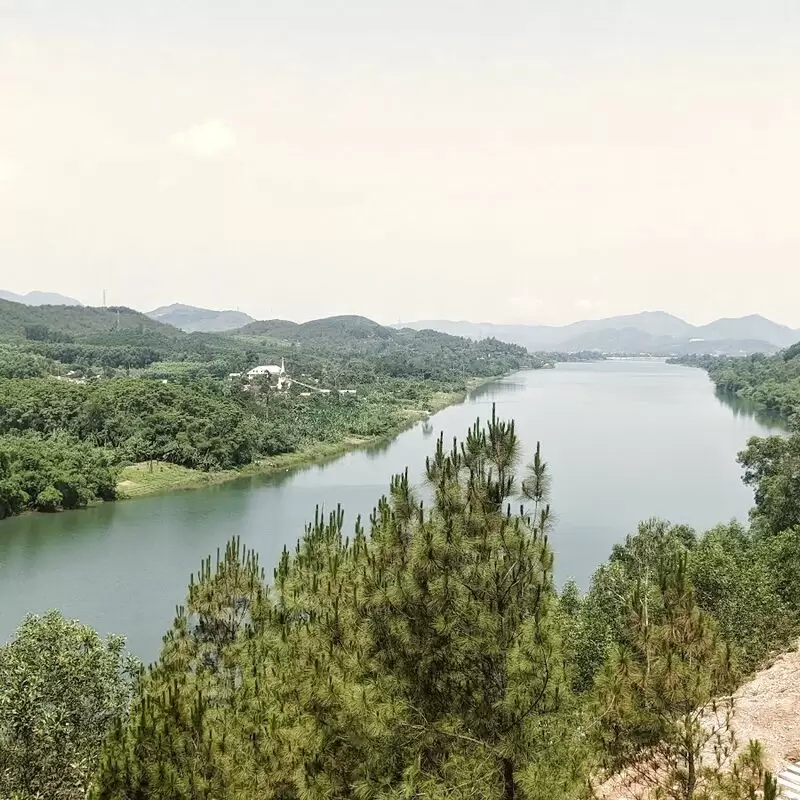 Vong Canh Hill
Vong Canh Hill
102 Huyền Trân Công Chúa, Thủy Biều, Thua Thien Hue
Monday - Sunday: Open 24 hours

102 Huyền Trân Công Chúa, Thủy Biều, Thua Thien Hue
7. Meridian Gate
Visiting the Meridian Gate in Hue is like traveling back in time. This majestically built gate leading to the Imperial City is a symbol of Vietnamese history and architecture. Sun-gilded dragons adorn it and whisper stories of past emperors. Its five entrances reflect the five cardinal virtues of Confucianism. A lesser known fact: only the emperor used the middle entrance. Nearby is the enchanting Forbidden Purple City, once home to the Vietnamese royal family. Take in Hue's majestic past with this unforgettable duo of attractions.
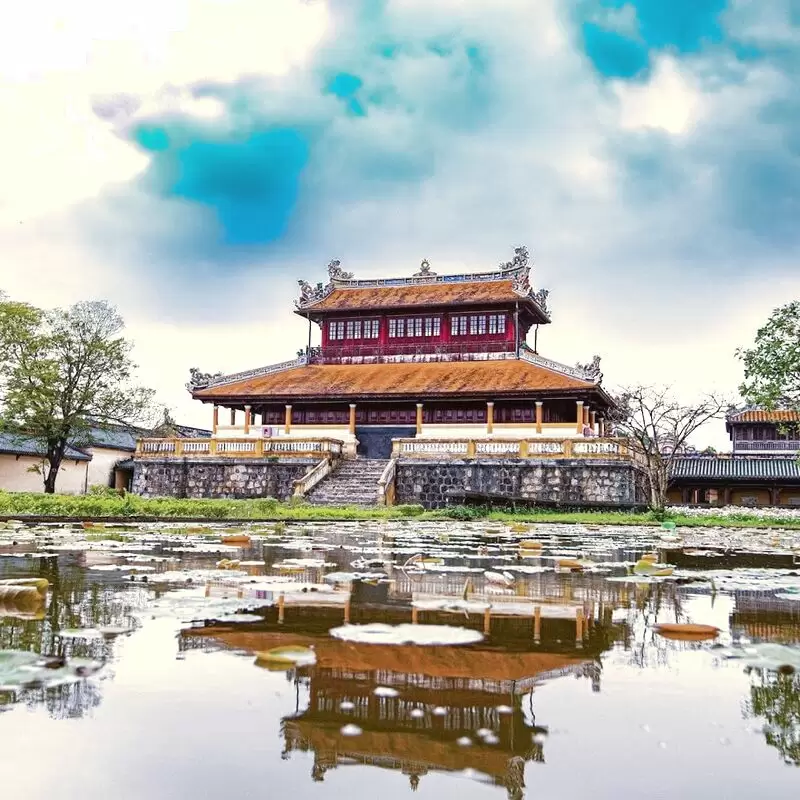 Meridian Gate
Meridian Gate
FH9H+3MF, Phú Hậu, Thua Thien Hue
Monday - Sunday: 7:00 AM – 5:00 PM

FH9H+3MF, Phú Hậu, Thua Thien Hue
8. Thuy Tien lake Abandoned Water Park
Immerse yourself in the eerie allure of Hue's Thuy Tien Lake Abandoned Water Park, a haunting tribute to a forgotten time. Overgrown by nature, this abandoned relic of excitement exudes quiet poetry - an Instagrammer's paradise. Insider tip: Visit early to avoid crowds and capture the misty morning over the desolate waterslides. Just a short drive away is the majestic Imperial City, a former capital full of ancient surprises to round out your day of discovery and eternal memories.
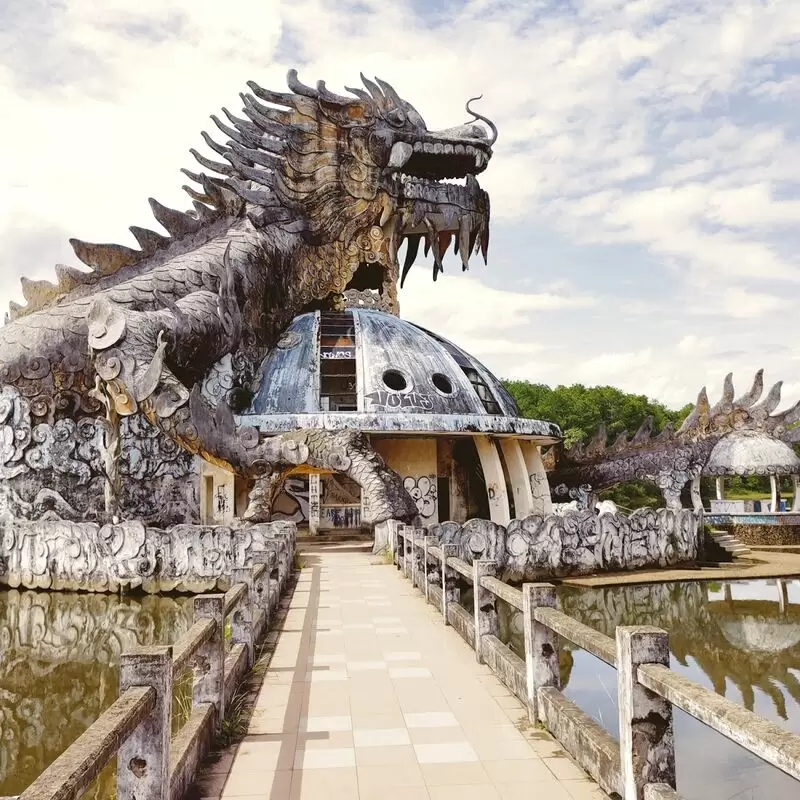 Thuy Tien lake Abandoned Water Park
Thuy Tien lake Abandoned Water Park
hồ Tiên, Thủy, CH5H+5CG, Thủy Bằng, Thua Thien Hue
Monday - Sunday: Open 24 hours

hồ Tiên, Thủy, CH5H+5CG, Thủy Bằng, Thua Thien Hue
9. Culture Pham Travel & Transports
Immerse yourself in Vietnamese culture with Culture Pham Travel & Transports. This is not just a travel service, but an authentic cultural experience that will delight you. Explore Hue's landmarks, sample delicious street food, and participate in interactive workshops. Delve deeper into the lives of locals as local guides share insider stories and hidden treasures off the beaten path. Nearby, you'll find the magnificent Imperial City, a magnificent testament to Vietnam's rich history that's not to be missed. Discover Hue the Culture Pham way.
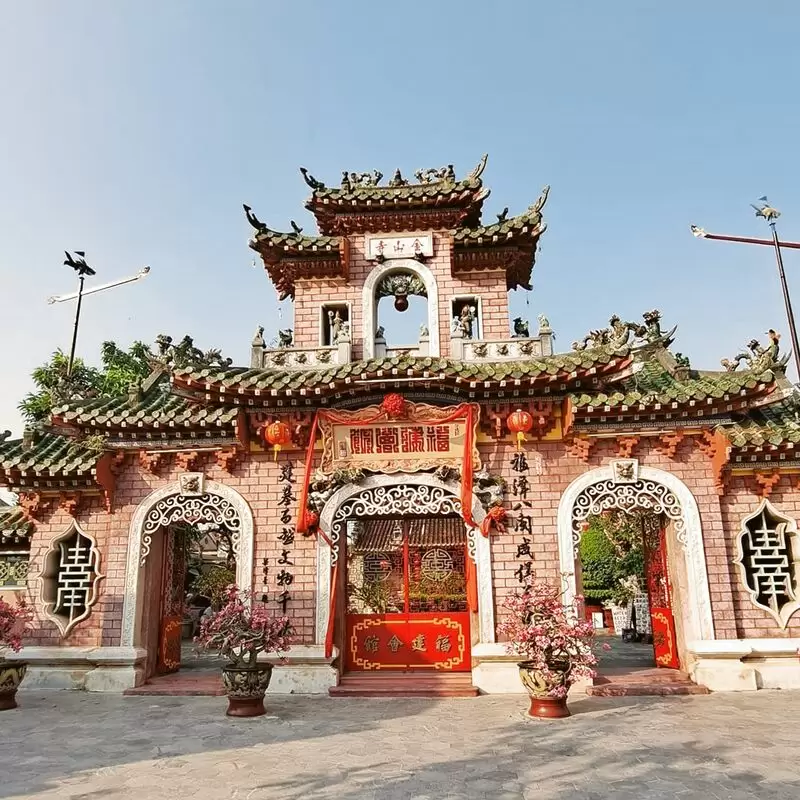 Culture Pham Travel & Transports
Culture Pham Travel & Transports
city, 17 Trần Thúc Nhẫn, Vĩnh Ninh, Thua Thien Hue
Monday - Sunday: Open 24 hours

city, 17 Trần Thúc Nhẫn, Vĩnh Ninh, Thua Thien Hue
10. February 3 Park
February 3 Park in Hue is an extraordinary mix of tranquil green spaces, sculptures and children's attractions. On a hot day, enjoy the shaded walkways and soak up the tranquil atmosphere. The park's name represents the date the city was liberated from the French. An insider tip: early in the morning, look out for locals practicing Tai Chi! Nearby, the Truong Tien Bridge spans the Perfume River, beautifully lit at night and a perfect end to your day.
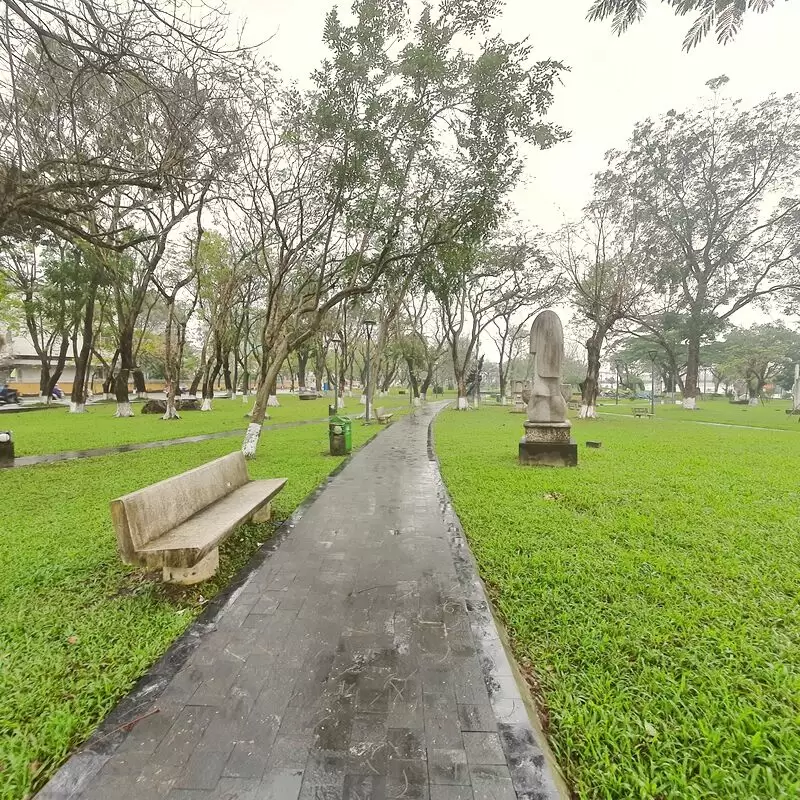 February 3 Park
February 3 Park
FH9V+Q4J, Huế Lê Lợi, Phú Hội, Thua Thien Hue
Monday - Sunday: Open 24 hours

FH9V+Q4J, Huế Lê Lợi, Phú Hội, Thua Thien Hue
11. Hue Museum of Royal Antiquities
Immerse yourself in Hue's imperial past at the famous Hue Museum of Royal Antiquities. Here you can marvel at over 10,000 artifacts from Vietnam's feudal era, including royal clothing, ceramics, and ornately crafted furniture. The museum itself is housed in the Long-An Palace, a charming historical site that adds authenticity to your cultural discovery tour. Did you know that some of the antiques here came from royal use? Just a stone's throw away is the famous Hue Citadel, a UNESCO World Heritage Site.
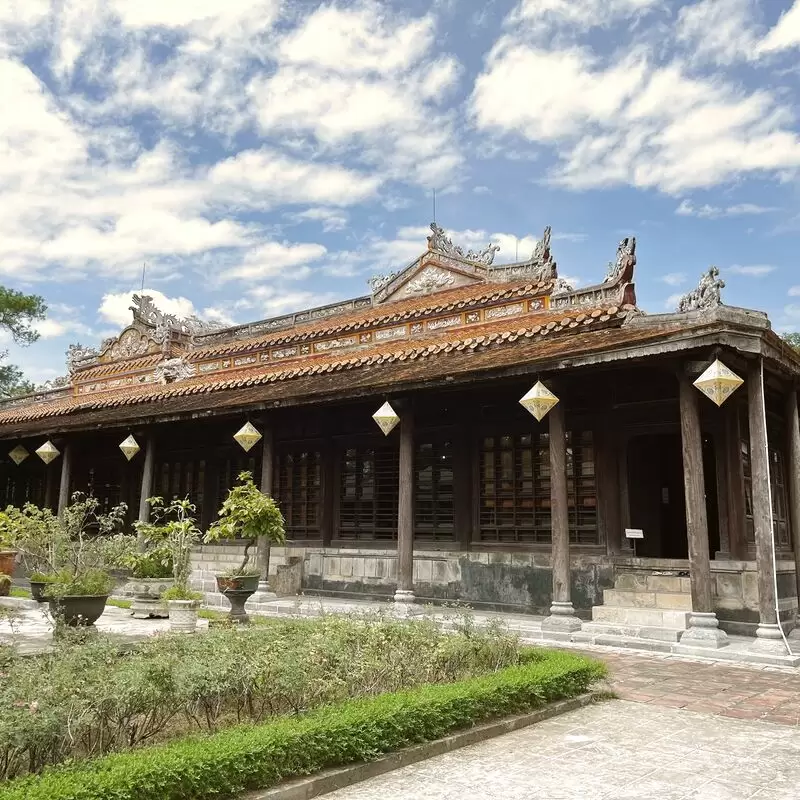 Hue Museum of Royal Antiquities
Hue Museum of Royal Antiquities
03 Lê Trực, Phú Hậu, Thua Thien Hue
Monday - Sunday: 7:00 AM – 5:30 PM

03 Lê Trực, Phú Hậu, Thua Thien Hue
12. Vincom Plaza Huế
Visit Vincom Plaza Huế for a world-class shopping experience in Hue, Vietnam! This impressive shopping center offers a taste of modern luxury with a mix of international and local brands. Don't miss the Sky Bar on the top floor for breathtaking views of the city. The Trang Tien Bridge, a historical and artistic landmark that is illuminated at night, is just a leisurely stroll away. Don't forget to try the delicious dishes at the huge food court - an ideal place to satisfy your culinary curiosity.
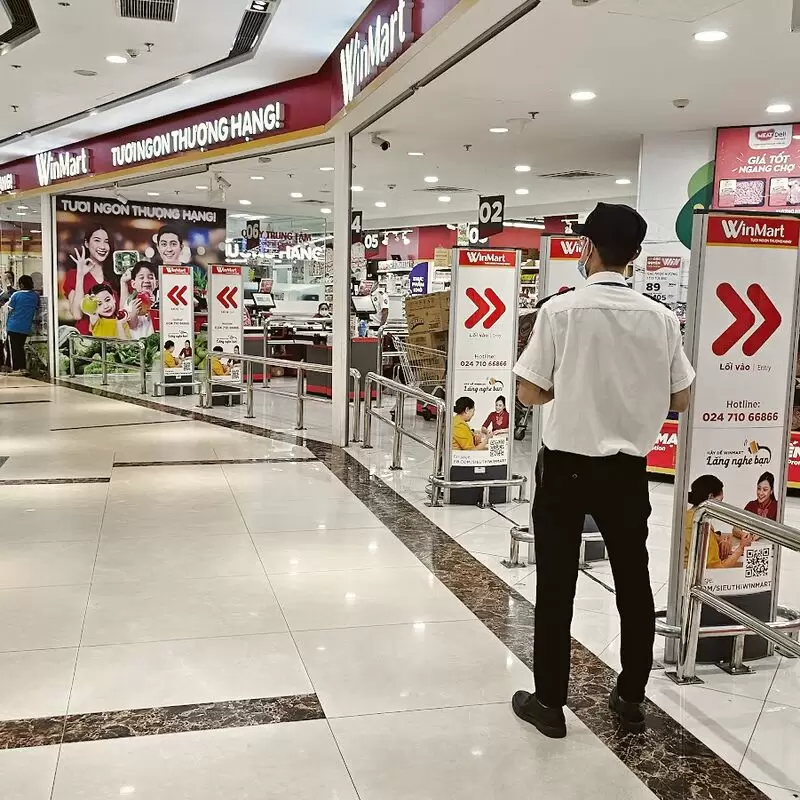 Vincom Plaza Huế
Vincom Plaza Huế
50A Hùng Vương, Phú Nhuận, Thua Thien Hue
Monday - Friday: 10:00 AM – 9:00 PM
Saturday - Sunday: 10:00 AM – 9:30 PM

50A Hùng Vương, Phú Nhuận, Thua Thien Hue
Saturday - Sunday: 10:00 AM – 9:30 PM
13. Dieu De Pagoda
Immerse yourself in the fascinating allure of Dieu De Pagoda, a 19th century shrine in Hue that welcomes you with its typical Vietnamese architecture and tranquil ambience. Here, the ancient Buddha statues and strikingly detailed murals tell a thousand stories of Buddhist philosophy. Unmissable is the Sakyamuni Buddha sitting peacefully under the Bo tree, a rare representation. Just a stone's throw away flows the tranquil Perfume River, an ideal place for a refreshing riverside walk after visiting the pagoda!
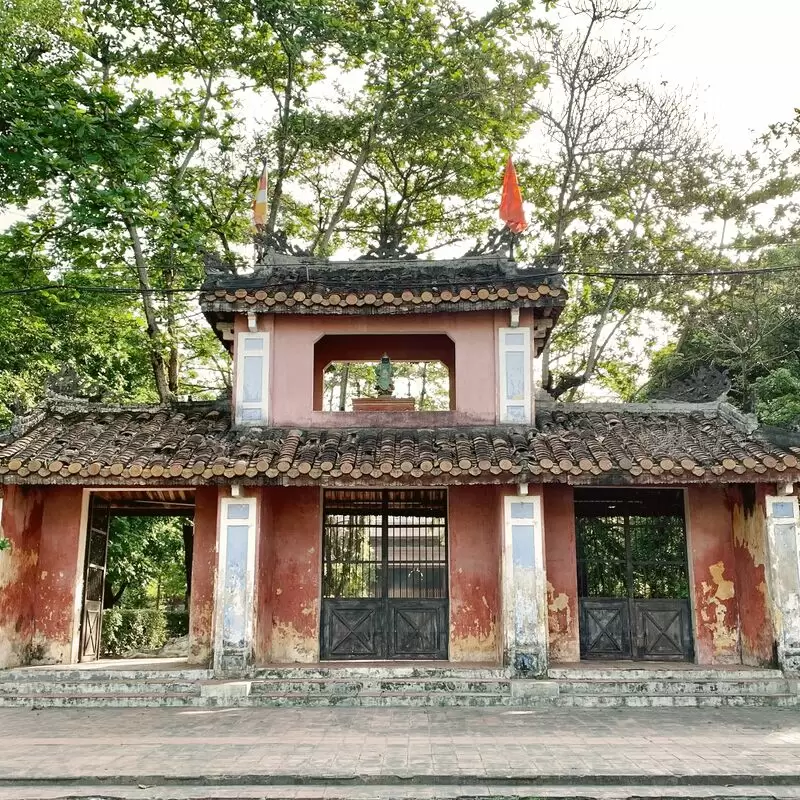 Dieu De Pagoda
Dieu De Pagoda
FHHP+5X5, Bạch Đằng, Phú Cát, Thua Thien Hue

FHHP+5X5, Bạch Đằng, Phú Cát, Thua Thien Hue
14. Hue Night Walking Street
A visit to Hue Night Walking Street is like a trip to the beating heart of Vietnamese culture. It is full of local food stalls, handmade souvenirs and street performances. What makes it unique is its strategic location right next to the famous Huong River. It is just a stone's throw away from the historic Truong Tien Bridge. Immerse yourself in the vibrant local culture, sample delicious street food and meet warm Vietnamese locals in their traditional Ao Dai. Nightlife in Hue has never been more exciting!
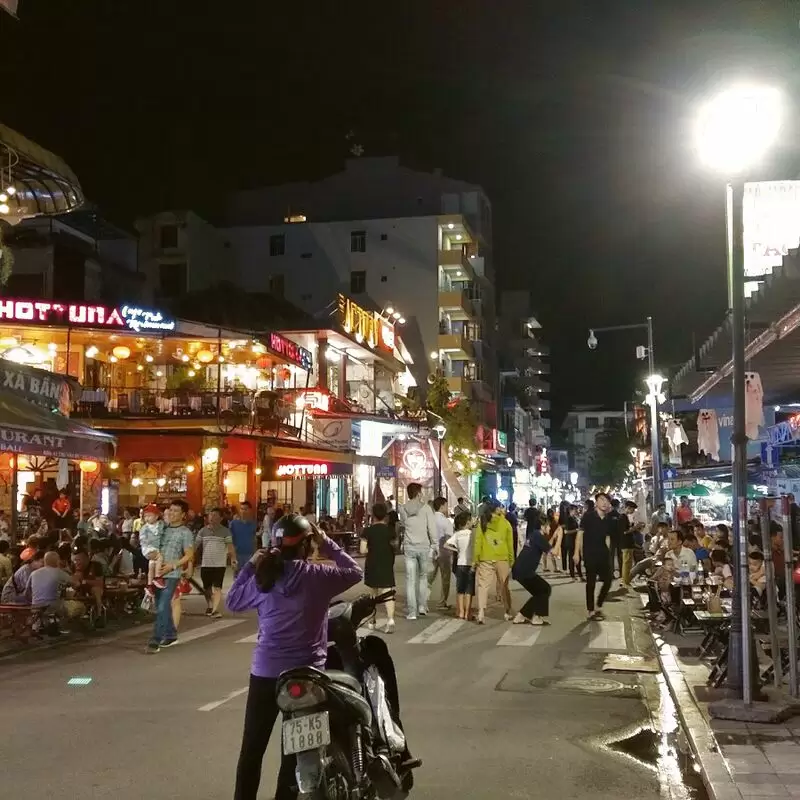 Hue Night Walking Street
Hue Night Walking Street
Chu Văn An, Phú Hội, Thua Thien Hue
Monday - Saturday: 6:00 PM – 2:00 AM
Sunday: 6:00 PM – 12:00 AM

Chu Văn An, Phú Hội, Thua Thien Hue
Sunday: 6:00 PM – 12:00 AM
15. Thái Hòa Palace
Immerse yourself in Vietnam's glorious past at Thái Hòa Palace, the centerpiece of the imperial city of Hue. The largest of 80 palaces, it reflects the splendor of the Nguyen Dynasty with its ornate wooden roof and timeless architecture. Discover the mysterious stories about the royal ceremonies that once took place here. Afterwards, take a leisurely stroll along the Perfume River or visit the nearby Forbidden Purple City to immerse yourself in history. Experience an era of opulence in a place once reserved only for royalty!
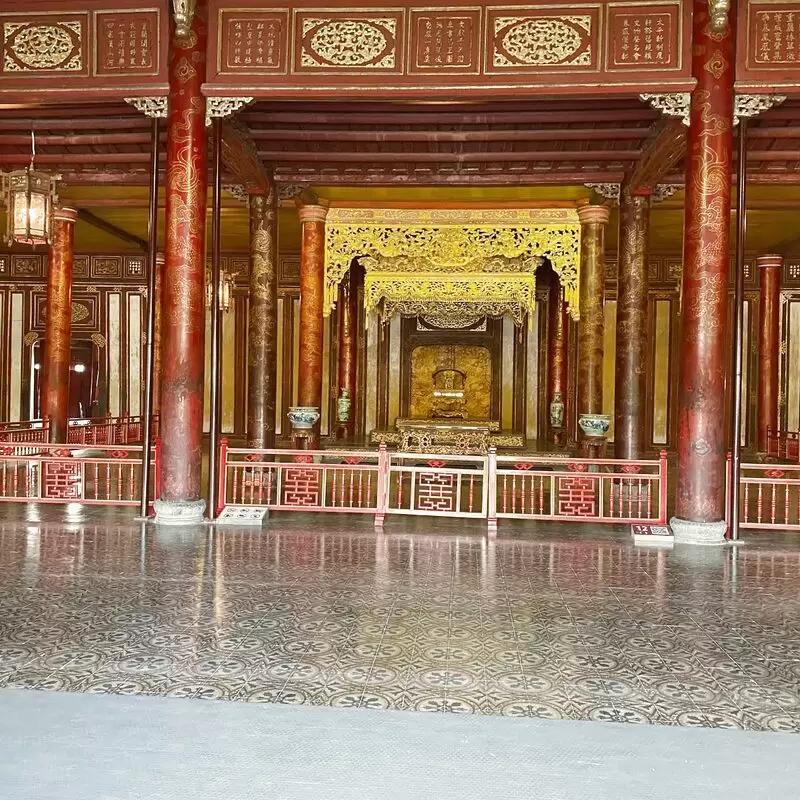 Thái Hòa Palace
Thái Hòa Palace
Điện Thái Hòa, Hai Mươi Ba Tháng Tám, Phú Hậu, Thua Thien Hue
Monday - Sunday: 6:30 AM – 5:00 PM

Điện Thái Hòa, Hai Mươi Ba Tháng Tám, Phú Hậu, Thua Thien Hue
16. Ancient Hue Garden Houses
The Ancient Hue Garden Houses in Hue, Vietnam, offer a magical portal into imperial life with erudite class. The traditional architecture and Vietnamese feng shui influence will enchant you at every turn. These historic mansions reveal the chronicles of the Nguyen Dynasty. Take a stroll and admire the meticulously landscaped gardens that showcase their own version of oriental art. Pro tip: don't miss the performance of traditional music. Near this site, Hue Citadel offers an exquisite tour through history amidst lush green surroundings. A walk towards the Imperial City offers an impressive historical experience.
 Ancient Hue Garden Houses
Ancient Hue Garden Houses
47 Kiệt 104 Kim Long, Kim Long, Thua Thien Hue
Monday - Sunday: Open 24 hours

47 Kiệt 104 Kim Long, Kim Long, Thua Thien Hue
17. Hon Chen
Embark on a spectacular journey through history and culture at "Hon Chen", a temple honoring the goddess Po Nagar. Marvel at the beautiful relics of the ancient Champa civilization. Experience the lively festival held twice a year - a colorful spectacle of music and dance. Not far from here, Thien Mu Pagoda awaits your exploration, housing a magnificent view of the Perfume River and a 400-year-old bronze bell. In Hue, the past blends harmoniously with the present, offering you unforgettable moments.
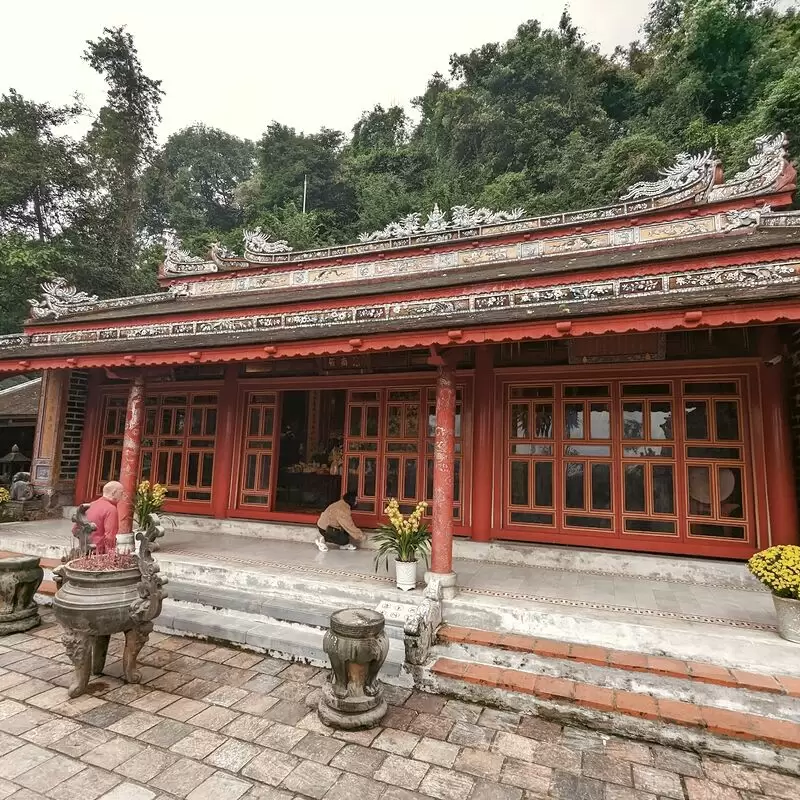 Hon Chen
Hon Chen

18. Duyet Thi Duong Royal Theater
The "Duyet Thi Duong Royal Theater", an epitome of royal splendor, is a must-see in Hue, Vietnam. Dating back to 1826, the theater is the oldest in the country and houses an exceptional collection of traditional Vietnamese art and music. Here you can experience exquisite cultural performances that reflect the enchanting music of the Nguyen Dynasty. Just a stone's throw away, the picturesque Truong San Residence awaits you with its lush gardens and ornate design. Truly a cultural treat for any visitor!
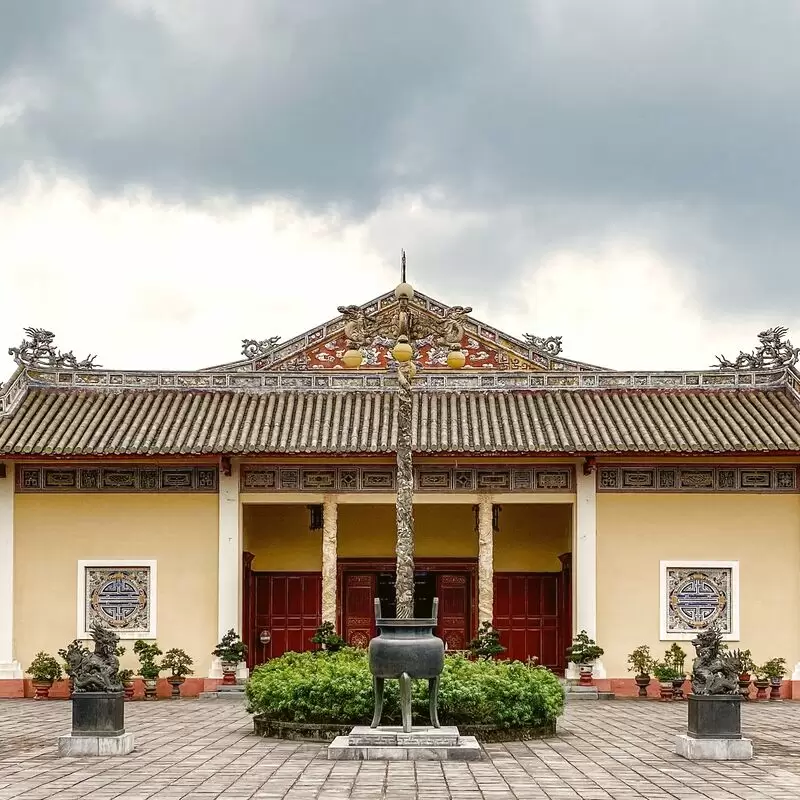 Duyet Thi Duong Royal Theater
Duyet Thi Duong Royal Theater

19. Kiến Trung Palace
A visit to Kiến Trung Palace is a must in Hue, Vietnam. It is a historical icon that is a testament to majestic royal architecture and symbolizes a magnificent era. Delve into the past and explore the palace's rich history and intricate design. An insider tip: don't miss the beautifully decorated dragon motifs! Nearby, the Forbidden Purple City, also a major local attraction, is just a short walk away for an unforgettable history-themed day!
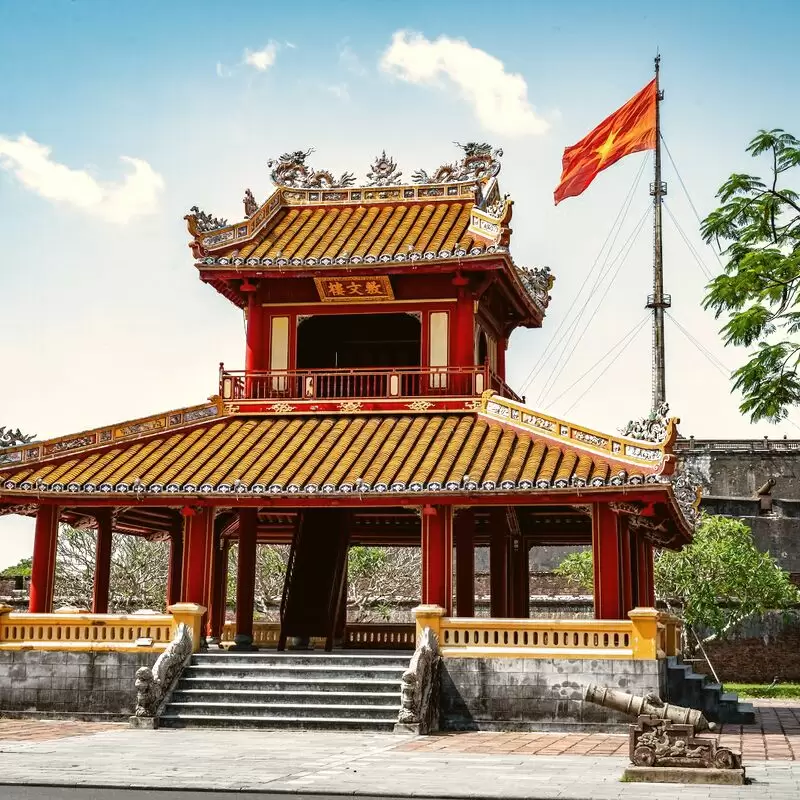 Kiến Trung Palace
Kiến Trung Palace
32 Đặng Thái Thân, Phú Hậu, Thua Thien Hue
Monday - Sunday: 7:30 AM – 5:30 PM

32 Đặng Thái Thân, Phú Hậu, Thua Thien Hue
20. Vườn Quốc Gia Bạch Mã
Embark on an adventure in Vietnam's stunning "Vườn Quốc Gia Bạch Mã" or Bach Ma National Park. Discover the biodiversity, exotic flora and fauna, and admire the panoramic view from the highest peak of the park. Be enchanted by the heavenly beauty of the Five Lakes, hidden waterfalls and old French villas. Don't forget to join a guided tour to discover hidden trails! Just 30 minutes away, you can explore the enchanting Tam Giang Lagoon, known for its magnificent sunsets.
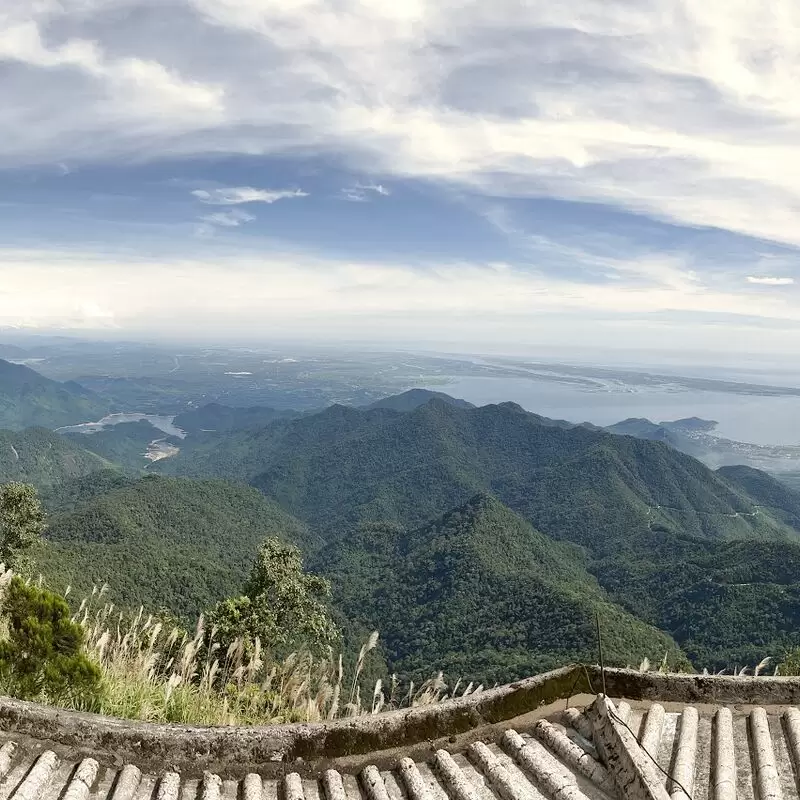 Vườn Quốc Gia Bạch Mã
Vườn Quốc Gia Bạch Mã

Best Time to Visit Hue
The best time to visit Hue, Vietnam, is from January to April during the dry season. These months have warm temperatures and less rain, ideal for outdoor activities and exploring the city's historic sites such as the Imperial Citadel and Thien Mu Pagoda.
Annual Weather in Hue
January
Jan
66 / 78 °F
19 / 26 °C
2
12
30
February
Feb
67 / 84 °F
20 / 29 °C
1
6
54
March
Mar
71 / 87 °F
22 / 30 °C
1
6
84
April
Apr
74 / 93 °F
24 / 34 °C
2
8
74
May
May
78 / 96 °F
26 / 35 °C
3
17
74
June
Jun
79 / 95 °F
26 / 35 °C
2
12
76
July
Jul
78 / 94 °F
26 / 34 °C
2
15
63
August
Aug
78 / 95 °F
25 / 35 °C
2
14
65
September
Sep
76 / 91 °F
25 / 32 °C
6
17
52
October
Oct
73 / 85 °F
23 / 30 °C
7
17
35
November
Nov
71 / 83 °F
22 / 28 °C
7
17
24
December
Dec
67 / 80 °F
19 / 26 °C
4
15
20
Questions & Answers
What is the local language?
The national language in Hue, Vietnam, is Vietnamese. As in other regions of Vietnam, the Northern Vietnamese dialect is spoken in Hue. However, it has a distinct regional accent that is influenced by the Central Vietnamese dialect. This peculiarity in pronunciation gives Vietnamese a unique musicality that often captivates listeners. The Vietnamese language uses the Latin alphabet and various diacritical marks, thanks to the romanized transcription system known as quốc ngữ.
What is the local currency?
The national currency of Hue, Vietnam, and the country as a whole is the Vietnamese Dong (VND). It is available in various denominations in bills and coins, with bills being the most common. As a traveler, it is important to know that the U.S. dollar is accepted in many places, but it is useful to carry dong for small purchases, local markets, and places off the beaten path. ATMs are available for cash withdrawals, and credit cards are accepted at most hotels, restaurants and stores.
How is public transportation in Hue?
Public transportation in Hue, Vietnam, is generally efficient and economical. The city offers a variety of options, including cabs, bicycle rickshaws, and motorcycle cabs for short distances. There is also a reliable bus system that serves the city and surrounding areas. Renting bicycles or motorcycles for self-exploration is popular with tourists. However, navigation can be challenging for first-time visitors due to language barriers and lack of clear signage.
Are there any unique customs that I should be aware of?
In Hue, Vietnam, it is customary to show respect to elders and remove your shoes when entering a person's home or a sacred place. Public displays of affection are considered inappropriate, so hold back on gestures. Also note that Vietnamese traditionally eat their meals on the floor or at low tables, often using chopsticks. Gratitude for food and hospitality, as well as skillful haggling at markets, are also part of the local culture.
Is it safe to travel around Hue at night?
Yes, it is generally safe to be out and about in Hue at night. Hue is known for its relaxed and peaceful atmosphere. The city is well lit and locals are often out and about in the evening. However, as with any other destination, it is advisable to take basic safety precautions, such as avoiding deserted areas late at night, not carrying too much cash, and watching your belongings. Public transportation may be scarce late at night, so plan your trip accordingly.
What is the traditional food in Hue?
Hue is known for its distinctive and refined cuisine. The city's traditional cuisine is strongly influenced by its royal heritage, and many dishes were originally created for the imperial court. Popular specialties include Bun Bo Hue, a spicy beef noodle soup; Banh Khoai, a crispy pancake with pork, shrimp and bean sprouts; and Com Hen, a savory dish of mussels, rice and various spices. Unique sweets such as Che Hue, a colorful array of traditional Vietnamese desserts, are also an important part of Hue's culinary culture.
Can I drink tap water in Hue?
Although tap water in Hue, Vietnam, meets local standards, tourists should not drink it directly due to differences in hygiene standards and the possible presence of unknown microorganisms. Instead, it is recommended to drink bottled water, which is cheap and available everywhere. For a longer stay, you can consider other safe options such as boiled or filtered water.
How can I respect the local culture and religion?
In Hue, Vietnam, it is important to respect local norms and prevailing Buddhist practices. Dress conservatively, especially when visiting religious sites such as pagodas and temples - your shoulders and knees should be covered. Public displays of affection are generally avoided. Respect elders and do not touch anyone's head as it is considered sacred. Be sure to ask before taking photos of locals or religious ceremonies. Always treat the locals and their customs with kindness and understanding.
What is the medical and health situation in Hue?
Hue, Vietnam, has good health care with private and public hospitals. However, it is not as advanced as Western standards, and specialized or serious treatments may require evacuation to larger cities or abroad. Pharmacies are widely available, but language barriers and counterfeit medicines pose challenges. It is important that visitors obtain comprehensive travel and health insurance. Basic health precautions such as drinking clean water, choosing food carefully, and taking measures against mosquitoes (vectors of dengue fever) are advisable.
Is it easy to communicate in English?
In popular destinations such as Hue, Vietnam, communication in English is reasonably possible, as staff at attractions, hotels, and restaurants often speak a smattering of English. However, language levels can vary and it can be difficult to communicate more complex thoughts or negotiate business deals. You may encounter language barriers in less touristy areas. It is always useful to know some common words or phrases in Vietnamese to make your trip smoother. Mobile translation apps can also be beneficial.
What is the tipping etiquette?
Tipping is not traditionally part of Vietnamese culture, and locals do not usually expect tips. However, with the increase in tourism, tipping has become more common, especially in tourist areas such as Hue. In restaurants, for example, a modest tip of about 5-10% is appreciated if the service charge is not included. Hotel staff and tour guides are also happy to tip if you are satisfied with their service. However, it is not obligatory and you should not feel obliged to tip if you are dissatisfied with the service.
Can I use credit cards or should I carry cash?
Credit cards are accepted in some places in Hue, Vietnam, but cash is often preferred, especially when eating at local restaurants or shopping at small merchants. ATMs are available throughout the area if you need to withdraw cash. It is also advisable to remember that credit card transactions may incur additional fees. Therefore, it is advisable to carry a certain amount of cash in Vietnamese dong to avoid possible additional charges.
Are there any specific security concerns?
Hue, Vietnam, is generally a safe destination with low crime rates and friendly locals. However, as in any popular destination, beware of pickpocketing and bag snatching, especially in busy areas. Scams targeting tourists, such as inflated prices or fake taxi meters, can also occur. Always use reputable cab companies and agree on prices in advance. It is advisable to avoid late night walks in deserted neighborhoods. Travelers should purchase travel insurance and follow local customs and regulations to have a safe and enjoyable trip.
What is the cost of living in Hue?
Hue, Vietnam, is relatively affordable for both locals and expatriates. Essentials such as food, electricity bills, transportation, and restaurant meals are probably cheaper than in Western countries. There are affordable and diverse housing options, from local houses to modern apartments that range from modest to extravagant. Public health care and education are also generally inexpensive. However, foreign goods, international schools, and Western-style health care facilities may come at a higher price. All in all, Hue offers comfortable, affordable living.
How can I dress appropriately for the local culture?
In Hue, Vietnam, it is important to dress modestly and respect the conservative culture. Avoid revealing clothing and prefer outfits that cover shoulders and knees, especially when visiting religious sites. Due to the tropical climate, lightweight, breathable fabrics are recommended. Traditional Vietnamese clothing such as "Ao Dai" (long dress with pants) for women and "Ao Ba Ba" (silk shirt with matching pants) for men is considered respectful. Always remove your shoes before entering a temple or a local's house.
Are there any age restrictions to consume alcohol?
In Vietnam, including Hue, the legal drinking age is 18. This means that people must be at least 18 years old to legally purchase and consume alcohol. This law is enforced in most places such as restaurants, stores and bars. However, it is important to know that culturally, underage drinking is not as strictly controlled as in many Western countries. Always remember to drink responsibly and respect local customs and laws.
What is the local etiquette for dining out?
In Hue, Vietnam, traditional dining etiquette is very important. It is polite to wait until the elders are seated and take the first bite before others begin eating. Chopsticks should be placed flat on the table or a chopstick tray when not in use; sticking them upright into food is considered highly disrespectful. Do not point your chopsticks at others. Meals are often shared, so take small amounts at a time. And don't forget to say "com ngon" (bon appétit) to show your appreciation.
Is it common to negotiate prices in the market?
Yes, it is quite common to negotiate prices in the markets in Hue, Vietnam. Sellers usually set prices for their goods and services in such a way that they expect some willingness to negotiate. However, this should be done politely and with respect. It is considered part of the local culture and can sometimes even be fun. But remember to put on a smile, be friendly and don't overdo it. Always remember that if you can't agree on a price, it's okay to thank the seller and leave.
Are there any specific laws for tourists?
In Hue, Vietnam, all foreign tourists must comply with local laws and regulations. Failure to comply may result in fines, imprisonment or deportation. Key laws include prohibiting drug trafficking and use, respecting religious beliefs and customs, and obtaining the necessary permits for certain activities such as hiking in national parks. Importantly, foreign tourists must carry their passports and immigration documents at all times. Vietnam also has strict rules about taking photographs near military and government buildings.
What’s the local wildlife like?
Hue, Vietnam, is rich in biodiversity and offers an enchanting mix of wildlife. The landscape is home to various species, some of which are exceptionally rare. You will find numerous species of birds, primates, reptiles and amphibians. Bach Ma National Park, in particular, is a wildlife paradise where visitors can see the endangered saola, also known as the Asian unicorn. The Luoi River and Thuan An Beach are also home to abundant marine life. It is a tropical ecosystem full of surprises.
Is it easy to rent a car or should I hire a driver?
While it is possible to rent a car in Hue, Vietnam, it is highly recommended to hire a driver due to some factors. It can be difficult to navigate city traffic, especially if you are unfamiliar with local driving habits. In addition, Vietnamese traffic laws require foreigners to have an international driver's license. Hiring a driver not only alleviates these concerns, but also enhances the experience, as local drivers often provide valuable information about the places you visit.
Is accommodating dietary restrictions possible at restaurants?
Yes, it is usually possible to accommodate dietary restrictions at restaurants in Hue, Vietnam, which are known for their diverse culinary culture. Most restaurants are understanding of dietary restrictions such as vegetarian, vegan and gluten-free diets. It is advisable that guests inform the staff of their dietary restrictions to ensure that they are served appropriately. Remember that English is not widely spoken, so write your restrictions in Vietnamese to avoid misunderstandings.
Can I use my electric appliances in Hue?
In Hue, Vietnam, the standard voltage is 220 V and the frequency is 50 Hz. If your electrical appliances work with the same voltage, you can use them without a voltage converter. However, the common plug types are A, C and D. If your plugs do not match, you will need an adapter. Before your trip, be sure to check the voltage and plug type of your appliances to ensure compatibility.
Is Hue a child-friendly city?
Hue, Vietnam, is indeed a child-friendly city. It offers a variety of activities that both children and adults can enjoy. From quiet boat rides on the Perfume River to exploring the ancient citadel, there are plenty of adventures for kids. The local cuisine is also very digestible for young palates. In addition, children are highly respected and valued in Vietnamese culture, ensuring a friendly and safe environment for the little ones.
Are there any local health remedies or practices I should know about?
In Hue, Vietnam, traditional medicine and remedies play a central role in daily life. One popular practice is drinking herbal tea made from local plants for various ailments. Acupuncture and cupping are also commonly used. Many locals believe that a healthy diet balances the body. As such, meals often incorporate the five elements (wood, fire, earth, metal and water) to promote overall well-being. For a safe experience, seek advice from local professionals or guides.
Feedback
I hope you found this article informative and helpful. I'm eager to improve the content and make it even more valuable for you. If you have any feedback or suggestions, I would love to hear from you.
Do you have any tips or hidden gems that you think should be added to the list? Are there any areas that you feel could use more explanation or clarification?
Your input is greatly appreciated and will help us to continue providing high-quality content that meets your needs and interests. Please feel free to share your thoughts.
What is the local language?
The national language in Hue, Vietnam, is Vietnamese. As in other regions of Vietnam, the Northern Vietnamese dialect is spoken in Hue. However, it has a distinct regional accent that is influenced by the Central Vietnamese dialect. This peculiarity in pronunciation gives Vietnamese a unique musicality that often captivates listeners. The Vietnamese language uses the Latin alphabet and various diacritical marks, thanks to the romanized transcription system known as quốc ngữ.
What is the local currency?
The national currency of Hue, Vietnam, and the country as a whole is the Vietnamese Dong (VND). It is available in various denominations in bills and coins, with bills being the most common. As a traveler, it is important to know that the U.S. dollar is accepted in many places, but it is useful to carry dong for small purchases, local markets, and places off the beaten path. ATMs are available for cash withdrawals, and credit cards are accepted at most hotels, restaurants and stores.
How is public transportation in Hue?
Public transportation in Hue, Vietnam, is generally efficient and economical. The city offers a variety of options, including cabs, bicycle rickshaws, and motorcycle cabs for short distances. There is also a reliable bus system that serves the city and surrounding areas. Renting bicycles or motorcycles for self-exploration is popular with tourists. However, navigation can be challenging for first-time visitors due to language barriers and lack of clear signage.
Are there any unique customs that I should be aware of?
In Hue, Vietnam, it is customary to show respect to elders and remove your shoes when entering a person's home or a sacred place. Public displays of affection are considered inappropriate, so hold back on gestures. Also note that Vietnamese traditionally eat their meals on the floor or at low tables, often using chopsticks. Gratitude for food and hospitality, as well as skillful haggling at markets, are also part of the local culture.
Is it safe to travel around Hue at night?
Yes, it is generally safe to be out and about in Hue at night. Hue is known for its relaxed and peaceful atmosphere. The city is well lit and locals are often out and about in the evening. However, as with any other destination, it is advisable to take basic safety precautions, such as avoiding deserted areas late at night, not carrying too much cash, and watching your belongings. Public transportation may be scarce late at night, so plan your trip accordingly.
What is the traditional food in Hue?
Hue is known for its distinctive and refined cuisine. The city's traditional cuisine is strongly influenced by its royal heritage, and many dishes were originally created for the imperial court. Popular specialties include Bun Bo Hue, a spicy beef noodle soup; Banh Khoai, a crispy pancake with pork, shrimp and bean sprouts; and Com Hen, a savory dish of mussels, rice and various spices. Unique sweets such as Che Hue, a colorful array of traditional Vietnamese desserts, are also an important part of Hue's culinary culture.
Can I drink tap water in Hue?
Although tap water in Hue, Vietnam, meets local standards, tourists should not drink it directly due to differences in hygiene standards and the possible presence of unknown microorganisms. Instead, it is recommended to drink bottled water, which is cheap and available everywhere. For a longer stay, you can consider other safe options such as boiled or filtered water.
How can I respect the local culture and religion?
In Hue, Vietnam, it is important to respect local norms and prevailing Buddhist practices. Dress conservatively, especially when visiting religious sites such as pagodas and temples - your shoulders and knees should be covered. Public displays of affection are generally avoided. Respect elders and do not touch anyone's head as it is considered sacred. Be sure to ask before taking photos of locals or religious ceremonies. Always treat the locals and their customs with kindness and understanding.
What is the medical and health situation in Hue?
Hue, Vietnam, has good health care with private and public hospitals. However, it is not as advanced as Western standards, and specialized or serious treatments may require evacuation to larger cities or abroad. Pharmacies are widely available, but language barriers and counterfeit medicines pose challenges. It is important that visitors obtain comprehensive travel and health insurance. Basic health precautions such as drinking clean water, choosing food carefully, and taking measures against mosquitoes (vectors of dengue fever) are advisable.
Is it easy to communicate in English?
In popular destinations such as Hue, Vietnam, communication in English is reasonably possible, as staff at attractions, hotels, and restaurants often speak a smattering of English. However, language levels can vary and it can be difficult to communicate more complex thoughts or negotiate business deals. You may encounter language barriers in less touristy areas. It is always useful to know some common words or phrases in Vietnamese to make your trip smoother. Mobile translation apps can also be beneficial.
What is the tipping etiquette?
Tipping is not traditionally part of Vietnamese culture, and locals do not usually expect tips. However, with the increase in tourism, tipping has become more common, especially in tourist areas such as Hue. In restaurants, for example, a modest tip of about 5-10% is appreciated if the service charge is not included. Hotel staff and tour guides are also happy to tip if you are satisfied with their service. However, it is not obligatory and you should not feel obliged to tip if you are dissatisfied with the service.
Can I use credit cards or should I carry cash?
Credit cards are accepted in some places in Hue, Vietnam, but cash is often preferred, especially when eating at local restaurants or shopping at small merchants. ATMs are available throughout the area if you need to withdraw cash. It is also advisable to remember that credit card transactions may incur additional fees. Therefore, it is advisable to carry a certain amount of cash in Vietnamese dong to avoid possible additional charges.
Are there any specific security concerns?
Hue, Vietnam, is generally a safe destination with low crime rates and friendly locals. However, as in any popular destination, beware of pickpocketing and bag snatching, especially in busy areas. Scams targeting tourists, such as inflated prices or fake taxi meters, can also occur. Always use reputable cab companies and agree on prices in advance. It is advisable to avoid late night walks in deserted neighborhoods. Travelers should purchase travel insurance and follow local customs and regulations to have a safe and enjoyable trip.
What is the cost of living in Hue?
Hue, Vietnam, is relatively affordable for both locals and expatriates. Essentials such as food, electricity bills, transportation, and restaurant meals are probably cheaper than in Western countries. There are affordable and diverse housing options, from local houses to modern apartments that range from modest to extravagant. Public health care and education are also generally inexpensive. However, foreign goods, international schools, and Western-style health care facilities may come at a higher price. All in all, Hue offers comfortable, affordable living.
How can I dress appropriately for the local culture?
In Hue, Vietnam, it is important to dress modestly and respect the conservative culture. Avoid revealing clothing and prefer outfits that cover shoulders and knees, especially when visiting religious sites. Due to the tropical climate, lightweight, breathable fabrics are recommended. Traditional Vietnamese clothing such as "Ao Dai" (long dress with pants) for women and "Ao Ba Ba" (silk shirt with matching pants) for men is considered respectful. Always remove your shoes before entering a temple or a local's house.
Are there any age restrictions to consume alcohol?
In Vietnam, including Hue, the legal drinking age is 18. This means that people must be at least 18 years old to legally purchase and consume alcohol. This law is enforced in most places such as restaurants, stores and bars. However, it is important to know that culturally, underage drinking is not as strictly controlled as in many Western countries. Always remember to drink responsibly and respect local customs and laws.
What is the local etiquette for dining out?
In Hue, Vietnam, traditional dining etiquette is very important. It is polite to wait until the elders are seated and take the first bite before others begin eating. Chopsticks should be placed flat on the table or a chopstick tray when not in use; sticking them upright into food is considered highly disrespectful. Do not point your chopsticks at others. Meals are often shared, so take small amounts at a time. And don't forget to say "com ngon" (bon appétit) to show your appreciation.
Is it common to negotiate prices in the market?
Yes, it is quite common to negotiate prices in the markets in Hue, Vietnam. Sellers usually set prices for their goods and services in such a way that they expect some willingness to negotiate. However, this should be done politely and with respect. It is considered part of the local culture and can sometimes even be fun. But remember to put on a smile, be friendly and don't overdo it. Always remember that if you can't agree on a price, it's okay to thank the seller and leave.
Are there any specific laws for tourists?
In Hue, Vietnam, all foreign tourists must comply with local laws and regulations. Failure to comply may result in fines, imprisonment or deportation. Key laws include prohibiting drug trafficking and use, respecting religious beliefs and customs, and obtaining the necessary permits for certain activities such as hiking in national parks. Importantly, foreign tourists must carry their passports and immigration documents at all times. Vietnam also has strict rules about taking photographs near military and government buildings.
What’s the local wildlife like?
Hue, Vietnam, is rich in biodiversity and offers an enchanting mix of wildlife. The landscape is home to various species, some of which are exceptionally rare. You will find numerous species of birds, primates, reptiles and amphibians. Bach Ma National Park, in particular, is a wildlife paradise where visitors can see the endangered saola, also known as the Asian unicorn. The Luoi River and Thuan An Beach are also home to abundant marine life. It is a tropical ecosystem full of surprises.
Is it easy to rent a car or should I hire a driver?
While it is possible to rent a car in Hue, Vietnam, it is highly recommended to hire a driver due to some factors. It can be difficult to navigate city traffic, especially if you are unfamiliar with local driving habits. In addition, Vietnamese traffic laws require foreigners to have an international driver's license. Hiring a driver not only alleviates these concerns, but also enhances the experience, as local drivers often provide valuable information about the places you visit.
Is accommodating dietary restrictions possible at restaurants?
Yes, it is usually possible to accommodate dietary restrictions at restaurants in Hue, Vietnam, which are known for their diverse culinary culture. Most restaurants are understanding of dietary restrictions such as vegetarian, vegan and gluten-free diets. It is advisable that guests inform the staff of their dietary restrictions to ensure that they are served appropriately. Remember that English is not widely spoken, so write your restrictions in Vietnamese to avoid misunderstandings.
Can I use my electric appliances in Hue?
In Hue, Vietnam, the standard voltage is 220 V and the frequency is 50 Hz. If your electrical appliances work with the same voltage, you can use them without a voltage converter. However, the common plug types are A, C and D. If your plugs do not match, you will need an adapter. Before your trip, be sure to check the voltage and plug type of your appliances to ensure compatibility.
Is Hue a child-friendly city?
Hue, Vietnam, is indeed a child-friendly city. It offers a variety of activities that both children and adults can enjoy. From quiet boat rides on the Perfume River to exploring the ancient citadel, there are plenty of adventures for kids. The local cuisine is also very digestible for young palates. In addition, children are highly respected and valued in Vietnamese culture, ensuring a friendly and safe environment for the little ones.
Are there any local health remedies or practices I should know about?
In Hue, Vietnam, traditional medicine and remedies play a central role in daily life. One popular practice is drinking herbal tea made from local plants for various ailments. Acupuncture and cupping are also commonly used. Many locals believe that a healthy diet balances the body. As such, meals often incorporate the five elements (wood, fire, earth, metal and water) to promote overall well-being. For a safe experience, seek advice from local professionals or guides.
Feedback
I hope you found this article informative and helpful. I'm eager to improve the content and make it even more valuable for you. If you have any feedback or suggestions, I would love to hear from you.
Do you have any tips or hidden gems that you think should be added to the list? Are there any areas that you feel could use more explanation or clarification?
Your input is greatly appreciated and will help us to continue providing high-quality content that meets your needs and interests. Please feel free to share your thoughts.
I hope you found this article informative and helpful. I'm eager to improve the content and make it even more valuable for you. If you have any feedback or suggestions, I would love to hear from you.
Do you have any tips or hidden gems that you think should be added to the list? Are there any areas that you feel could use more explanation or clarification?
Your input is greatly appreciated and will help us to continue providing high-quality content that meets your needs and interests. Please feel free to share your thoughts.

